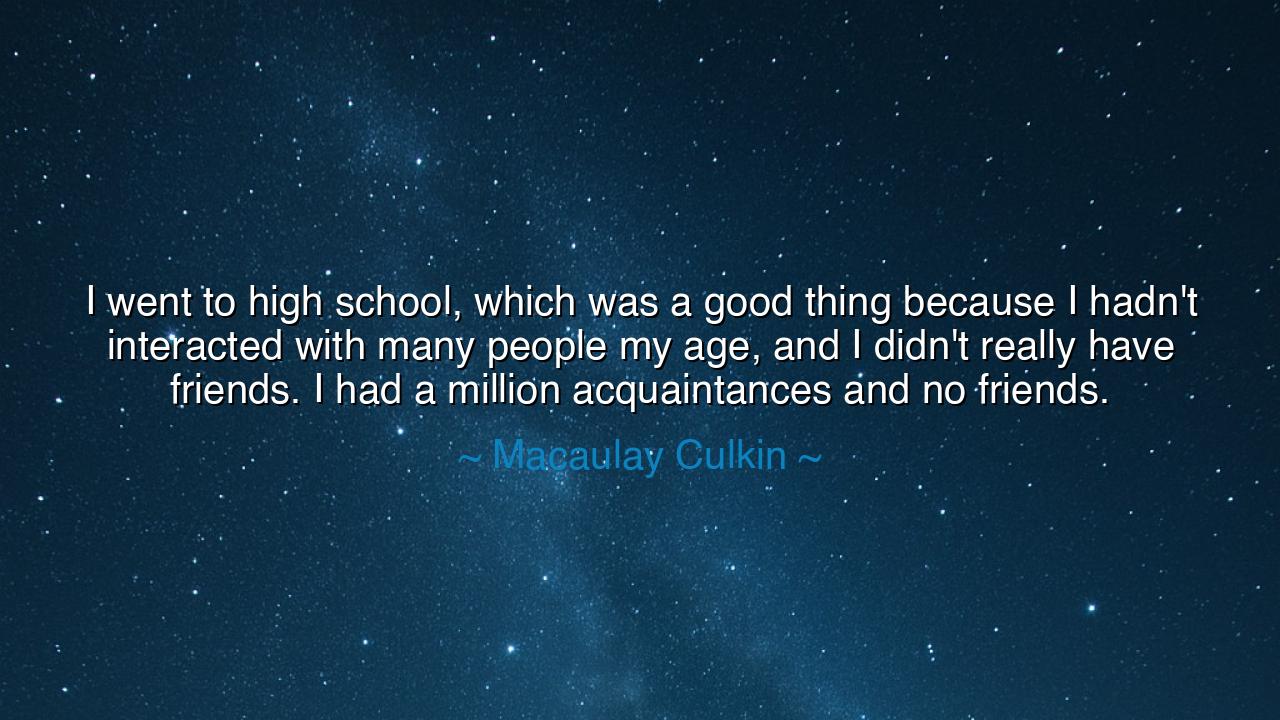
I went to high school, which was a good thing because I hadn't
I went to high school, which was a good thing because I hadn't interacted with many people my age, and I didn't really have friends. I had a million acquaintances and no friends.






In the labyrinth of life, where each person treads their own path, there exists a profound yearning for true connection. Yet, in the cacophony of the world, where many voices shout for attention, one can find themselves surrounded by a multitude of acquaintances—a sea of faces that pass by, leaving no mark upon the soul. Macaulay Culkin, a name known to many for his early fame, once spoke of this strange solitude in the midst of a crowd. He said, “I went to high school, which was a good thing because I hadn't interacted with many people my age, and I didn't really have friends. I had a million acquaintances and no friends.” His words cut through the illusion that proximity alone can bring meaning to our lives. For there is a great difference between knowing many and truly connecting with a few.
To be surrounded by acquaintances is to live in a world of fleeting shadows. These are the people with whom we share brief exchanges—perhaps a smile, a handshake, or a casual conversation. But they are not the ones who truly know us, who understand our struggles, our joys, our fears. True friendship, as Culkin points out, is something far more profound. It is a bond that is not formed by circumstance or mere interaction, but by the shared depth of understanding, trust, and mutual respect. It is in the absence of this deep connection that one might feel the ache of loneliness, even when surrounded by many.
The ancients understood the significance of true companionship. In the heart of Plato's philosophy, the idea of true friendship was elevated to a place of great importance. In his works, especially in the Lysis, he spoke of friendships that transcended mere social contract or convenience. For Plato, the true friend is not one who simply shares in the pleasures of life, but one who helps shape your very soul, one who nurtures you toward the good, toward the virtuous. It is a relationship that deepens over time, bound not by social expectation but by the mutual striving for something greater.
Yet how often do we find ourselves, as Culkin describes, surrounded by acquaintances who offer no depth, no substance? Friendship is a rare jewel in the marketplace of human interaction. We exchange pleasantries with many, but how many among them truly see us? How many share in our triumphs and stand beside us in our darkest hours? The shallow waters of acquaintance are often mistaken for the deep rivers of friendship, but they offer no true nourishment for the soul.
Consider the story of Alexander the Great, whose conquests stretched across the known world. While he surrounded himself with generals and advisors, Aristotle, his childhood mentor and lifelong friend, was the one who truly shaped his mind and heart. Aristotle’s wisdom was not merely academic but deeply personal, a bond forged in the fires of shared experience. Unlike the many who flattered Alexander for their own gain, Aristotle stood as his true friend, offering not only knowledge but truth. It is through such friendships that we are molded and transformed. In the absence of this, one is left to navigate the world with only the faceless tide of acquaintances to keep them company.
The lesson of Culkin’s words is clear: we must seek more than the surface-level interactions that define modern life. In a world filled with digital connections and transient relationships, we must strive to cultivate true friendships, those rare and precious bonds that are built on trust, understanding, and shared experience. It is not enough to know many; we must learn to connect with a few, to open our hearts to those who will walk with us through both the joys and trials of life. Just as the great philosophers of old understood that true companionship is a reflection of the soul’s deepest needs, we must also seek friendships that nurture our spirit, not just our ego.
In our own lives, let us make a conscious effort to move beyond the mere acquaintances that populate our circles. Let us seek those whose hearts beat in tune with our own, those who will challenge us, support us, and stand by us. Friendship is not given lightly, but is earned through patience, vulnerability, and a willingness to share in both the light and the dark. In a world that often values the fleeting over the profound, let us remember the ancient wisdom that true friendship is a treasure—one worth seeking, one worth keeping. And as we find such friendships, we will discover that we are no longer surrounded by the multitude of acquaintances, but are blessed with the few who truly know us, and whom we, in turn, truly know.






AAdministratorAdministrator
Welcome, honored guests. Please leave a comment, we will respond soon